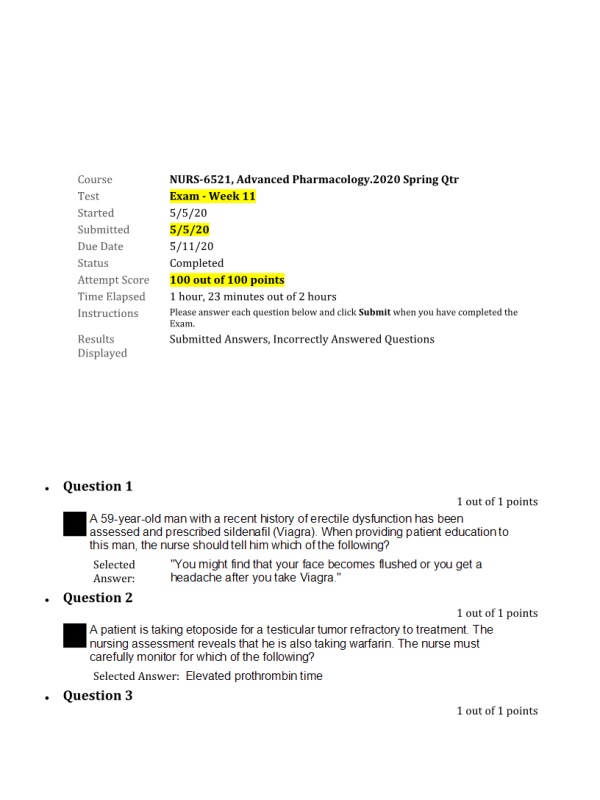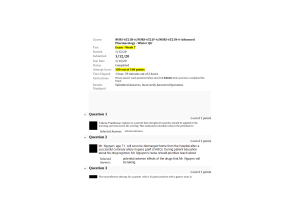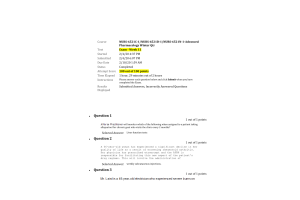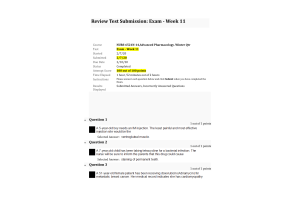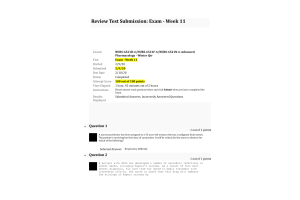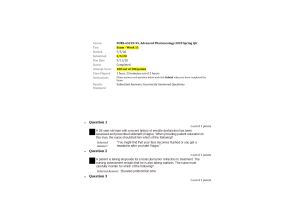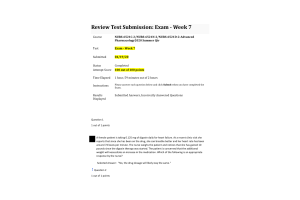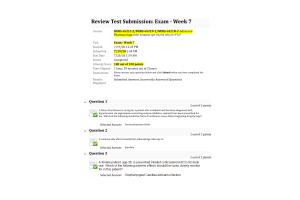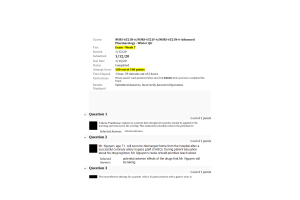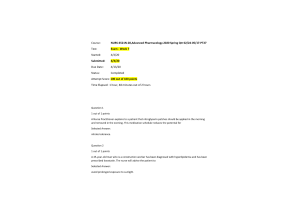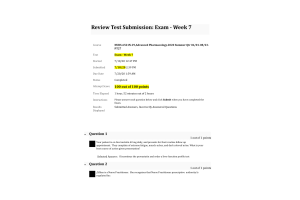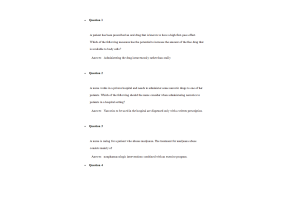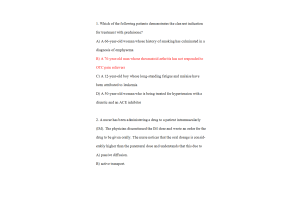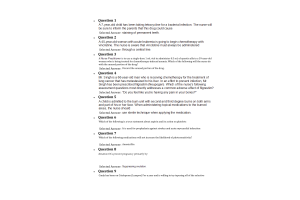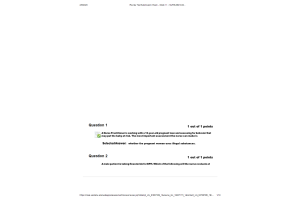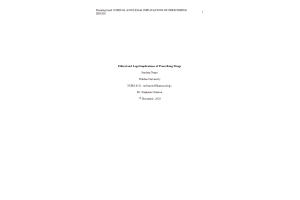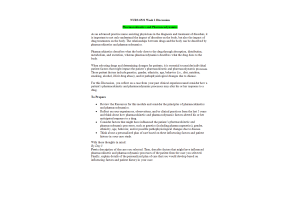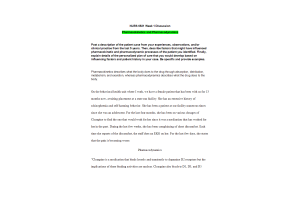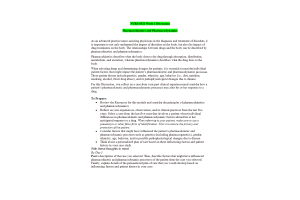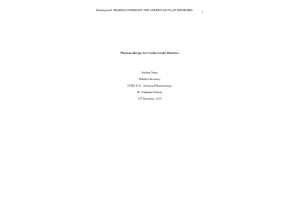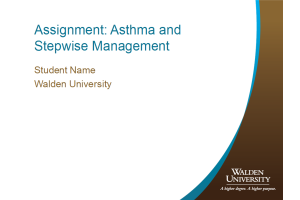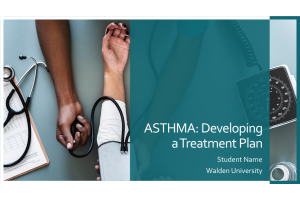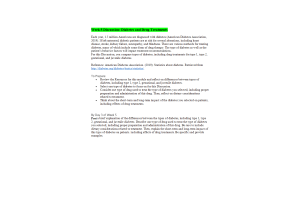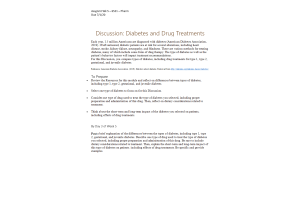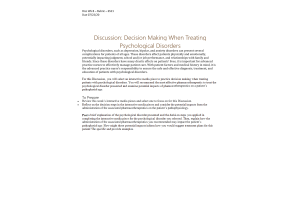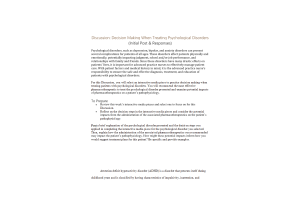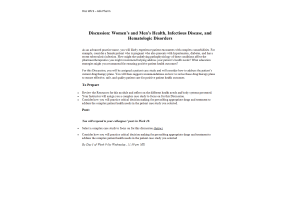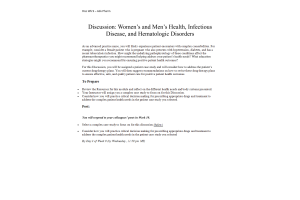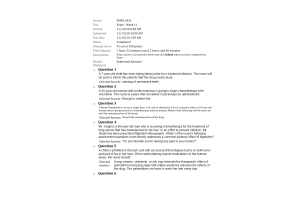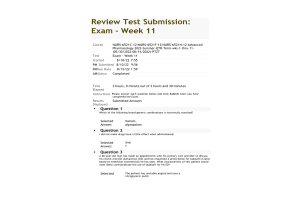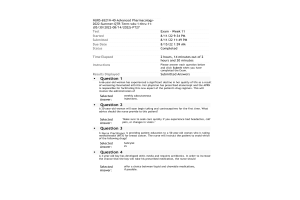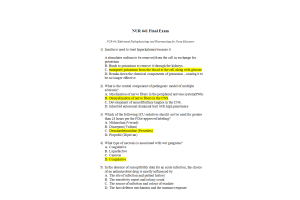NURS 6521 Week 11 Final Exam (100% Correct)
- $39.00
- Question: A 59-year-old man with a recent history of erectile dysfunction has been assessed and prescribed sildenafil (Viagra). When providing patient education to this man, the nurse should tell him which of the following?
- Question: A patient is taking etoposide for a testicular tumor refractory to treatment. The nursing assessment reveals that he is also taking warfarin. The nurse must carefully monitor for which of the following?
- Question: A man is prescribed ciprofloxacin to treat a sexually transmitted infection. The nurse will instruct the patient to
- Question: Drugs have a valid medical use but a high potential for abuse, both psychological and physiologic. In an emergency, a Schedule 2 drug may be prescribed by telephone if a written prescription cannot be provided at the time. However, a written prescription must be provided within 72 hours with the words authorization for emergency dispensing written on the prescription. These prescriptions cannot be refilled. A new prescription must be written each time. Examples include certain amphetamines and barbiturates. This is scheduled drug
- Question: A 16-year-old boy is prescribed cromolyn sodium nasal spray to treat a nasal allergy. To maximize the therapeutic effects of the drug, which of the following will the nurse include in instructions to the patient?
- Question: A woman is receiving magnesium sulfate for intrapartum eclampsia. The patient is perspiring and her blood pressure is 88/50. The serum magnesium level is 10 mg/dL. The nurse will interpret these manifestations as
- Question: A patient with a recent diagnosis of chronic myelogenous leukemia (CML) is discussing treatment options with his care team. What aspect of the patient's condition would contraindicate the use of cyclophosphamide for the treatment of leukemia?
- Question: After 6 months of unsuccessfully trying to conceive, a 31-year-old woman and her husband have sought a referral to a fertility specialist in order to explore their options. A nurse at the clinic should recognize that the woman may benefit from
- Question: A 34-year-old male has been diagnosed with TB and will be started on INH therapy. The medication history reveals that he currently takes antacids on a regular basis. The nurse will instruct the patient to take
- Question: A Nurse Practitioner working in a cancer center is preparing to administer medication to a 5-year-old child. The nurse will calculate the drug dosage by using
- Question: An older adult woman has been diagnosed with acute lymphoblastic leukemia (ALL) and her care team has identified potential benefits of imatinib. Which of the following characteristics of this patient's current health status may preclude the use of imatinib?
- Question: A male patient is trying to decide if he should use finasteride (Proscar) to treat benign prostatic hypertrophy (BPH). When providing information about the drug, the nurse will include which of the following as a risk associated with finasteride therapy?
- Question: A Nurse Practitioner will instruct a patient taking allopurinol to take each dose
- Question: A patient has acquired primary hypogonadism and has been prescribed testosterone transdermal (Androderm) patches. When educating the patient on how to administer the drug, the nurse will instruct him to
- Question: A 66-year-old woman has experienced a significant decline in her quality of life as a result of worsening rheumatoid arthritis. Her physician has prescribed etanercept and the APRN is responsible for facilitating this new aspect of the patient's drug regimen. This will involve the administration of
- Question: A 54-year-old woman with a history of osteoporosis has been prescribed ciprofloxacin for recurrent cystitis. Because of the patient's history, the nurse would be sure to discuss with the woman the use of
- Question: A Nurse Practitioner has questioned why a patient's physician has prescribed a narrow-spectrum antibiotic rather than a broad-spectrum drug in the treatment of a patient's infection. Which of the following facts provides the best rationale for the use of narrow-spectrum antibiotics whenever possible?
- Question: A 3-year-old boy has developed otitis media and requires antibiotics. In order to increase the chance that the boy will take his prescribed medication, the nurse should
- Question: Which of the following would a Nurse Practitioner assess for in a patient who is taking polymyxin B systemically?
- Question: A woman is receiving prolonged drug therapy during her complicated pregnancy, and it may pose a risk to both the mother and the fetus. The primary care physician has made dosage adjustments to minimize adverse effects and prevent toxicity. The nurse should make sure
- Question: A female patient is taking oral cyclophosphamide therapy for breast cancer. Because of possible adverse effects of the drug, the nurse will instruct the patient to do which of the following?
- Question: A pregnant patient who has diabetes has been admitted to the hospital to begin labor. Since the patient has diabetes, the physician has decided to use oxytocin (Pitocin) to initiate labor contractions. When talking to the patient about the adverse effects of the drug, the nurse should understand that the most common adverse effects of the drug include
- Question: A nurse practitioner has been assigned to a 55-year-old woman who has a malignant brain tumor. The patient is receiving her first dose of carmustine. It will be critical for the nurse to observe for which of the following?
- Question: A patient has been admitted to the critical care unit with a diagnosis of peritonitis that has necessitated treatment with gentamicin. As a result, the care team should be cautious when concurrently administering other medications that may cause
- Question: A 66-year-old man has made an appointment with his primary care provider to discuss his recent erectile dysfunction (ED) and has requested a prescription for tadalafil (Cialis) based on television commercials he has seen. What characteristic of this patient would most likely contraindicate the use of tadalafil for his ED?
- Question: A 29-year-old woman who is morbidly obese has recently begun a comprehensive, medically-supervised program of weight reduction. Prior to adding dextroamphetamine (Dexedrine) to her regimen, the patient should be questioned about her intake of
- Question: A 68-year-old man is being treated for benign prostatic hypertrophy (BPH) and began treatment with finasteride (Proscar) 3 months ago. When planning the care of this patient, what desired outcome should the nurse prioritize?
- Question: A Nurse Practitioner is to use a single-dose 1 mL vial to administer 0.5 mL of epoetin alfa to a 39-year-old woman who is being treated for chemotherapy-induced anemia. Which of the following will the nurse do with the unused portion of the drug?
- Question: A 36-year-old woman with a history of dysmenorrhea has begun treatment with progesterone, which she will be receiving by the intramuscular route. The nurse participating in the woman's care should prioritize which of the following potential nursing diagnoses?
- Question: A 33-year-old man has developed acute gouty arthritis. He has been prescribed colchicine. When developing a care plan for this patient, which factor will be most important for the nurse to consider?
- Question: A Nurse Practitioner is obtaining baseline physical data from a 7-year-old patient who is to be started on dextroamphetamine for ADHD. After obtaining vital signs, height, and weight, the nurse will prepare the patient for an
- Question: Mr. Lepp is a 63-year-old man who was diagnosed with colon cancer several weeks ago and who is scheduled to begin chemotherapy. He reports to the nurse that he read about the need for erythropoietin in an online forum for cancer patients and wants to explore the use of epoetin alfa with his oncologist. Which of the following facts should underlie the nurse's response to Mr. Lepp?
- Question: A Nurse Practitioner has completed a medication reconciliation of a patient who has been admitted following a motor vehicle accident. Among the many drugs that the patient has received in the previous year is rituximab. The nurse would be justified in suspecting the patient may have received treatment for which of the following diseases?
- Question: An oncology nurse is aware of the risks for injury that exist around the preparation, transportation, and administration of chemotherapeutic agents. In order to reduce these risks of injury, the nurse should take which of the following actions?
- Question: A patient is receiving long-term clindamycin therapy for a life-threatening infection. The nurse will begin by monitoring this drug therapy by obtaining
- Question: A 45-year-old woman with acute leukemia is going to begin chemotherapy with vincristine. The nurse is aware that vincristine must always be administered
- Question: A patient is taking rifampin (Rifadin) for active TB. When discussing this drug with the patient, the nurse should stress that
- Question: A 30-year-old woman who is in the first trimester of pregnancy has presented to her primary care provider with a 4-day history of a reddened, itchy left eye that is crusted with purulent exudate. The clinician suspects a bacterial, rather than viral, etiology. How will the patient's pregnancy affect the potential use of ciprofloxacin to treat her conjunctivitis?
- Question: A male patient is taking finasteride for BPH. Which of the following will the nurse evaluate at each clinic visit?
- Question: A 62-year-old patient taking tamoxifen exhibits increased bone and tumor pain along with a local disease flare. The nurse interprets this as an indication of which of the following?
- Question: A nurse practitioner orders a single dose of 2 g Metronidazole orally. How many milligrams will the patient receive in one dose?
- Question: A 56-year-old woman will soon begin treatment of her overactive bladder with tolterodine (Detrol). What patient teaching should the nurse provide to this woman?
- Question: A patient is being seen in the emergency department for a sprained ankle and is given a drug to relieve pain. When a second dose of the pain medication is given, the patient develops redness of the skin, itching, and swelling at the site of injection of the drug. The most likely cause of this response is
- Question: A 29-year-old pregnant patient is extremely upset about having to take medication for a pre-existing medical condition. She is consumed with fear that her baby will be born with a physical deformity or a congenital anomaly but knows that she has to take the medication. She talks constantly about this and is unable to sleep most nights. Which of the following is the most appropriate nursing diagnosis for this patient is?
- Question: A 15-year-old boy who has been taking dextroamphetamine for the treatment of ADHD has been experiencing a depressed mood and a sense of hopelessness. He confides in the school nurse that he has begun taking his stepfather's antidepressant to improve his mood. After immediately phoning the boy's stepfather, the nurse learns that the drug in question is phenelzine (Nardil), a monoamine oxidase inhibitor (MAOI). The nurse should recognize that this combination of drugs creates a serious risk of what health problem?
- Question: A patient has been admitted to the critical care unit of the hospital with bacterial septicemia that has failed to respond to initial antibiotic treatment. The patient's most recent blood cultures reveal the presence of methicillin-resistant Staphylococcus aureus (MRSA) in the patient's blood. The nurse will anticipate that this patient will likely require intravenous administration of what antibiotic?
- Question: A 73-year-old woman has osteoporosis and is prescribed alendronate. She takes calcium and vitamin D supplements, drinks lots of water, and has just quit smoking. The nurse should advise the patient to also
- Question: A Nurse Practitioner is performing patient education for a woman who has just been prescribed a bisphosphonate. Which of the following diagnostic and history findings would have prompted the woman's care provider to prescribe a bisphosphonate?
- Question: A Nurse Practitioner is providing patient education to a 50-year-old woman who is taking methotrexate (MTX) for breast cancer. The nurse will instruct the patient to avoid which of the following drugs?
- Question: A Nurse Practitioner is caring for a patient who is at 28 weeks' gestation and is receiving terbutaline (Brethine) to control preterm labor. Which of the following assessment parameters should the nurse prioritize?
- Question: A Nurse Practitioner educator who coordinates the staff education on an oncology unit is conducting an inservice on targeted therapies. What potential benefit of targeted therapies should the nurse highlight in this education session?
- Question: Laboratory testing has confirmed that a patient has chloroquine-resistant malaria and the patient's physician has prescribed quinine along with an adjunctive drug. The nurse should question the physician's order if the patient has a history of
- Question: When planning care for a patient who is receiving filgrastim (Neupogen) for a nonmyeloid malignancy, the nurse should formulate which of the following patient outcomes? (Select all that apply.)
- Question: A 67-year-old man who is being treated for prostate cancer is taking epoetin alfa. The nurse will instruct the patient to
- Question: A 12-year-old boy is being discharged from the hospital after major surgery. The boy will be taking two medications at home for an extended period. The nurse who is discharging the patient should provide medication teaching specifically to
- Question: A Nurse Practitioner is reviewing the prepregnancy medication regimen of a patient who has just had a positive pregnancy test. The nurse should be aware of which of the following changes in pharmacokinetics that accompanies pregnancy?
- Question: A patient is to begin taking tobramycin (Nebcin) for a nosocomial infection. Which of the following assessments should the nurse prioritize?
- Question: A Nurse Practitioner is assigned to a patient who is at 32 weeks' gestation and is receiving terbutaline (Brethine) IV for 24 hours to control preterm labor. Which of the following nursing actions will the nurse take to decrease the risk of hypotension and promote circulation to the fetus?
- Question: A patient is taking flavoxate hydrochloride (Urispas) to help control an overactive bladder. On a follow-up visit to the clinic, the nurse will question the patient about which of the following?
- Question: A 60-year-old patient experienced a sudden onset of chest pain and shortness of breath and was subsequently diagnosed with a pulmonary embolism in the emergency department. The patient has been started on an intravenous heparin infusion. How does this drug achieve therapeutic effect?
- Question: A Nurse Practitioner who provides care on a pediatric unit of a hospital is aware that the potential for harm as a result of drug errors is higher among infants and children than adults. This fact is primarily due to
- Question: A Nurse Practitioner is providing patient education to a 13-year-old girl who was just diagnosed with type 1 diabetes mellitus. Which of the following statements by the patient will alert the nurse that special instructions regarding insulin are necessary?
- Question: A Nurse Practitioner is explaining to a pregnant 21-year-old college student why she cannot continue to take ibuprofen (Advil) for her headaches. The nurse draws a picture depicting drug molecules crossing the placental membrane and entering into the fetal circulation. The nurse tells the
- Question: During ongoing assessment of a patient receiving 5-FU therapy, the nurse finds the patient's platelet count to be 92,000 cells/mm3. The nurse should do which of the following?
- Question: A Nurse Practitioner is working with a 16-year-old pregnant teen and assessing for behavior that may put the baby at risk. The most important assessment the nurse can make is
- Question: A patient will soon begin targeted therapy as a component of her treatment plan for chronic leukemia. The nurse is conducting health education about this new aspect of the patient's drug regimen and the patient has asked about the potential side effects of treatment. How should the nurse best respond?
- Question: A 20-year-old female patient is receiving topical clindamycin for acne vulgaris. She develops a rash and urticaria along with severe itching where the medication is applied. The nurse will formulate which of the following nursing diagnoses for the patient?
- Question: A 19-year-old patient reports to a clinic with vaginal discharge with a foul odor. A microscopic exam reveals trichomonas vaginalis. The nurse practitioner is aware that
- Question: A Nurse Practitioner is having difficulty administering a bitter drug to a 5-year-old child. The nurse should
- Question: A school nurse has been teaching high school students about the risks associated with marijuana use. However, the nurse has been met with considerable skepticism on the part of students, most of whom believe that marijuana is a benign drug. Which of the following teaching points should the nurse provide?
- Question: A 6-month-old child has developed skin irritation due to an allergic reaction. He has been prescribed a topical skin ointment. The nurse will consider which of the following before administering the drug?
- Question: A Nurse Practitioner works at a weight management clinic. To which of the following overweight patients could the nurse safely administer dextroamphetamine?
- Question: Morphine has been prescribed for a 28-year-old man with severe pain due to a back injury. The nurse will advise the patient to avoid
- Question: An immunocompromised 7-year-old child was recently discharged home with a peripherally-inserted central line (PIC line) for home antibiotic therapy. He has now been brought to the emergency department by his mother and father with signs and symptoms of line sepsis. Upon questioning, the mother states that she has been removing the PIC dressing daily and washing the site with warm water and a cloth. What nursing diagnosis is most appropriate in this situation?
- Question: A 20-year-old woman has been prescribed estrogen. As with all women taking estrogen, the nurse will carefully monitor the patient for which of the following?
- Question: A 5-year-old boy needs an IM injection. The least painful and most effective injection site would be the
- Question: Alendronate (Fosamax) is prescribed for a 67-year-old postmenopausal woman. In order to help prevent gastrointestinal distress, the nurse will advise the patient to
- Question: A male patient is experiencing climacteric symptoms secondary to androgen deficiency. His physician has prescribed testosterone. The nursing assessment reveals that the patient has had a myocardial infarction. The combination of testosterone therapy and a history of myocardial infarction would place that patient at a significantly higher risk of
- Question: A Nurse Practitioner is instructing a 19-year-old female patient on the use of fluconazole for candida vaginitis. A teaching priority will be to
- Question: A postmenopausal patient is prescribed bisphosphonates to treat osteoporosis. The nurse will instruct the patient to take the drug
- Question: A man has a demonstrated history of androgen deficiency and the consequences of this health problem include an inability to maintain an erection. Which of the following medications would best address this patient's erectile dysfunction (ED)?
- Question: A Nurse Practitioner is caring for a patient with cancer who has been prescribed dronabinol (Marinol) to help reduce nausea and vomiting from chemotherapy. The nurse will inform the patient that he or she is taking an oral form of
- Question: Which of the following patients will be at the greatest risk for anemia and would be the most likely candidate for epoetin alfa therapy?
- Question: A woman who is in the second trimester of her first pregnancy has been experiencing frequent headaches and has sought advice from her nurse practitioner about safe treatment options. What analgesic can the nurse most safely recommend?
- Question: A pregnant patient asks the Nurse Practitioner what over-the-counter medication she can take for recurring headaches. The nurse should recommend
- Question: An immunocompromised cancer patient has developed cryptococcal meningitis and been admitted to the intensive care unit for treatment with amphotericin B. How should the nurse most safely administer this drug?
- Question: A 38-year-old pregnant patient admits to the Nurse Practitioner that she is an alcoholic and has been consuming alcohol during her pregnancy. The nurse knows that using alcohol during pregnancy may result in a child who presents with
- Question: A patient with AIDS has developed a number of secondary infections in recent weeks, including Kaposi's sarcoma. As a result of this most recent diagnosis, his care team has opted to begin treatment with interferon alfa-2a. The nurse is aware that this drug will address the etiology of Kaposi sarcoma by
- Question: A 7-year-old child has been taking tetracycline for a bacterial infection. The nurse will be sure to inform the parents that this drug could cause
- Question: A patient has completed 4 weeks of treatment with epoetin alfa. Which of the following assessment findings would most strongly indicate that treatment has been effective?
- Question: The clinical nurse educator who oversees the emergency department in a children's hospital has launched an awareness program aimed at reducing drug errors. What measure addresses the most common cause of incorrect doses in the care of infants and children?
- Question: A 20-year-old woman will soon begin taking oral contraceptives for the first time. What advice should the nurse provide to this patient?
- Question: A 45-year-old female patient is prescribed ciprofloxacin to treat a bronchial infection. A nursing assessment revealed that she started taking daily vitamin supplements about 2 years ago. To maximize the therapeutic effects of the ciprofloxacin therapy, the nurse should advise the patient to
- Question: A male patient is receiving heparin by continuous intravenous infusion. The nurse will instruct the patient and family members to report which of the following should it occur?
- Question: A patient with non-Hodgkin's lymphoma (NHL) will be starting a course of doxorubicin shortly. When planning this patient's care, what nursing diagnosis should the nurse prioritize?
- Question: A 65-year-old woman has an advanced form of rheumatoid arthritis. Her treatment includes a regular dosage of methotrexate. The APRN will advise her to take which of the following vitamin supplements while taking the drug?
- Question: A 46-year-old man is receiving a quinupristin/dalfopristin IV infusion for a life-threatening infection. Which of the following would be most important for the nurse to monitor?
- Question: A 51-year-old female patient has been receiving doxorubicin (Adriamycin) for metastatic breast cancer. Her medical record indicates she has cardiomyopathy and a cumulative dose of 300 mg/m2 of doxorubicin. Which of the following measures would help limit the severity of the cardiomyopathy in this patient?
- Question: The Nurse Practitioner has established peripheral IV access and begun an infusion of magnesium sulfate on a 29-year-old antepartum patient who is 35 weeks pregnant. Which of the following assessment findings most likely prompted the patient's physician to order magnesium sulfate for this patient?
- Question: A Nurse Practitioner is explaining the use of acyclovir therapy to a 72-year-old man. Nephrotoxicity is discussed as a major adverse effect in older patients. To minimize the risk of the patient developing this adverse effect, the nurse will advise him to
- Question: When completing this exam, did you comply with Walden University’s Code of Conduct including the expectations for academic integrity?
